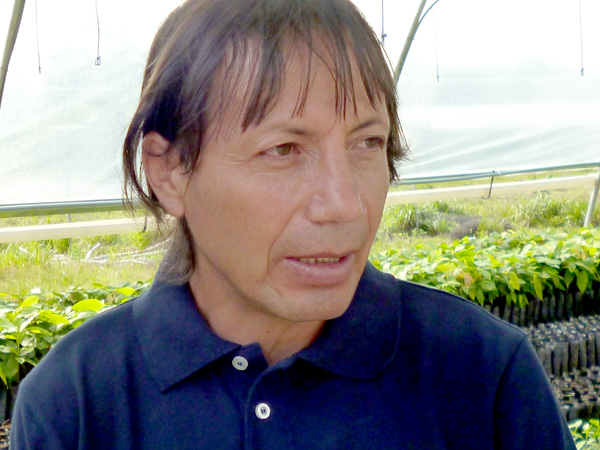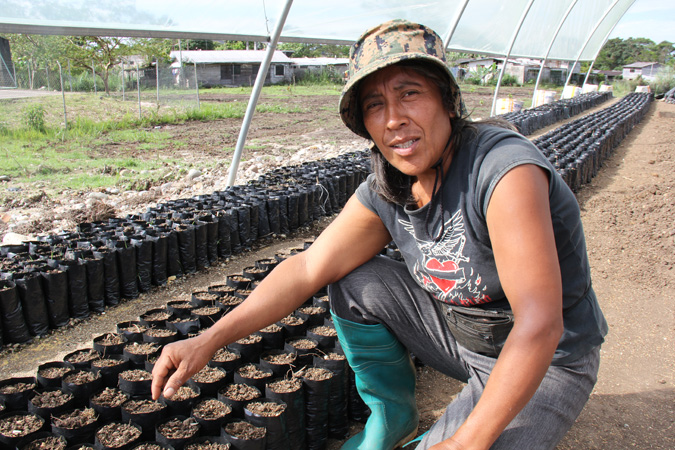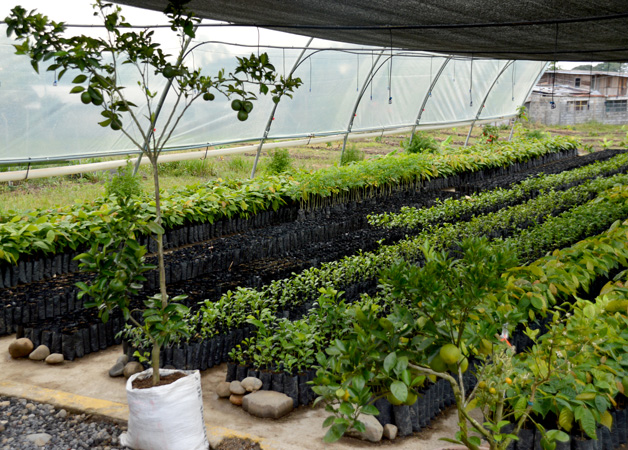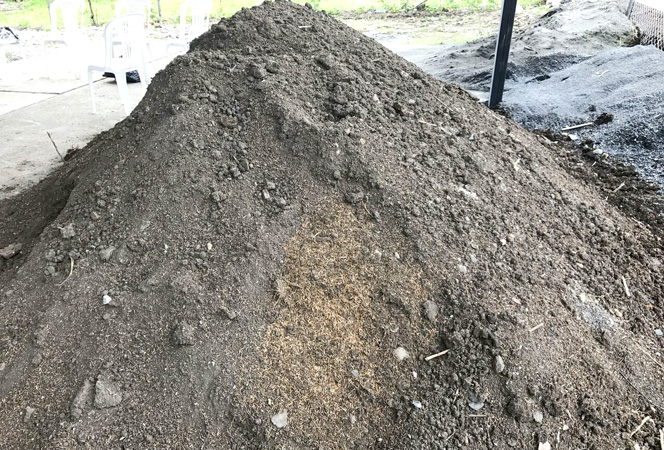MENU
(Nov. 22, 2017 - by Ralph Kurtenbach) Ovidio Gomez came up the hard way in Ecuador, and he readily admits it. In spite of a tough start, however, he is now an accomplished agronomist.
 “At the age of 14 it occurred to me that my daddy was living on the land, and yet here we were poor and hungry,” he says. “Meanwhile, those who knew something of agronomy were eating better. So I ran away from home. I left and started studying agronomy at a high school in [nearby] Patate, working every afternoon and going to school in the morning.”
“At the age of 14 it occurred to me that my daddy was living on the land, and yet here we were poor and hungry,” he says. “Meanwhile, those who knew something of agronomy were eating better. So I ran away from home. I left and started studying agronomy at a high school in [nearby] Patate, working every afternoon and going to school in the morning.”
With college out of reach, Gomez began working as an agricultural technician. It was during those early years that he also married Fanny Sanchez who had studied agronomy with him. They now have three children living at home who are learning the profession as well. “I have spent 25 years getting my ‘degree,’” he relates. “I’ve asked that life itself grant my title in this field.”
 Speaking in Shell, Ecuador, at the September inauguration of Reach Beyond’s first greenhouse, Gomez told of facing challenges as an agronomist. He recounted how a person had once told him he was “preparing garbage that wasn’t going to produce … but that’s OK because sometimes people’s ignorance offers guidelines with which we [agronomy] technicians can move forward.” Then explaining the soil of the nearby rainforest, he said it is commonly excessive in moisture and high in alkaline (they dried it for use in the greenhouse).
Speaking in Shell, Ecuador, at the September inauguration of Reach Beyond’s first greenhouse, Gomez told of facing challenges as an agronomist. He recounted how a person had once told him he was “preparing garbage that wasn’t going to produce … but that’s OK because sometimes people’s ignorance offers guidelines with which we [agronomy] technicians can move forward.” Then explaining the soil of the nearby rainforest, he said it is commonly excessive in moisture and high in alkaline (they dried it for use in the greenhouse).
Passionate about plants, he eschews public speaking and found himself in need of a whiteboard to better express himself in front of 180 people gathered for the Shell event. Rising to the occasion, nonetheless, he boldly proclaimed what must happen for jungle dwellers to have more varied gardens and a cash crop. Gomez, since moving to Pastaza [province], has realized that people from remote areas—even the poorest—possess land, but its ideal use is often neglected.
 “People’s greatest poverty is ignorance,” he said. “We want to enter in with opportunity for creating wealth by living with them, sharing day by day and doing the work because significant results only come about by getting plants in the ground early and working throughout the day.”
“People’s greatest poverty is ignorance,” he said. “We want to enter in with opportunity for creating wealth by living with them, sharing day by day and doing the work because significant results only come about by getting plants in the ground early and working throughout the day.”
“A rural person needs to do as we did in the mountains, getting out there at four in the morning and going to bed at 10 o’clock at night,” he said, “So too, a public employee needs to do the same, getting out there with a machete or a hoe and working with the people. We don’t want bosses and technicians here; we want those who lead by helping the people.”
Then Gomez—in a nod to Reach Beyond’s Wim de Groen and Eric Fogg who helped spearhead the mission’s greenhouse initiative—said that “those who direct this project are people who stick.” Hired earlier this year, Gomez—with untiring assistance from Fanny—has populated the greenhouse with over 20,000 cacao plants. Additionally, there are 2,000 orange trees plus a variety of vegetables.
 De Groen and Fogg view cacao as an eventual cash crop for the villages. Their hope is for a result that intertwines economic benefit to communities with spiritual instruction in Christianity. As community folk from the jungle come to Shell to learn more about the plants, spiritual topics will also be addressed, according to Fogg, who directs the greenhouse as well as clean water projects.
De Groen and Fogg view cacao as an eventual cash crop for the villages. Their hope is for a result that intertwines economic benefit to communities with spiritual instruction in Christianity. As community folk from the jungle come to Shell to learn more about the plants, spiritual topics will also be addressed, according to Fogg, who directs the greenhouse as well as clean water projects.
“We want to start with our three strongest [jungle] communities (Iwia, Machient and Santa Rosa, all with good progress on Reach Beyond clean water projects) so that they’ll have the best chance of success,” Fogg said. “Then they can demonstrate to the government what can be done.” Although well intentioned by Ecuador’s government, a crops program for the Amazon region proved unsuccessful; instruction did not accompany distribution of the plants.
“We can help the people learn how to take care of the plants, and we can help educate them on how to grow the plants better and faster,” noted de Groen, director of Reach Beyond’s community development efforts.
“We hope that through this entire process that the spiritual side—as it gets developed here—that the training will be able to start in January or February [2018]. The plants aren’t quite large enough to be placed in community just yet,” added Fogg.
As the greenhouse ministry takes shape, at its center is Gomez—quiet, unassuming and passionate about plants. A question on the contents of his backpack would reveal a lot.
“Oh, he’s excited to show you; he will open his backpack and pull out half a corn, three bits of a bean,” recounted Fogg. “He walks around with about 30 kinds of seeds; he can’t wait to tell you how cool these seeds are.”
Hermann Schirmacher contributed to this story.
Source: Reach Beyond
 “At the age of 14 it occurred to me that my daddy was living on the land, and yet here we were poor and hungry,” he says. “Meanwhile, those who knew something of agronomy were eating better. So I ran away from home. I left and started studying agronomy at a high school in [nearby] Patate, working every afternoon and going to school in the morning.”
“At the age of 14 it occurred to me that my daddy was living on the land, and yet here we were poor and hungry,” he says. “Meanwhile, those who knew something of agronomy were eating better. So I ran away from home. I left and started studying agronomy at a high school in [nearby] Patate, working every afternoon and going to school in the morning.”With college out of reach, Gomez began working as an agricultural technician. It was during those early years that he also married Fanny Sanchez who had studied agronomy with him. They now have three children living at home who are learning the profession as well. “I have spent 25 years getting my ‘degree,’” he relates. “I’ve asked that life itself grant my title in this field.”
 Speaking in Shell, Ecuador, at the September inauguration of Reach Beyond’s first greenhouse, Gomez told of facing challenges as an agronomist. He recounted how a person had once told him he was “preparing garbage that wasn’t going to produce … but that’s OK because sometimes people’s ignorance offers guidelines with which we [agronomy] technicians can move forward.” Then explaining the soil of the nearby rainforest, he said it is commonly excessive in moisture and high in alkaline (they dried it for use in the greenhouse).
Speaking in Shell, Ecuador, at the September inauguration of Reach Beyond’s first greenhouse, Gomez told of facing challenges as an agronomist. He recounted how a person had once told him he was “preparing garbage that wasn’t going to produce … but that’s OK because sometimes people’s ignorance offers guidelines with which we [agronomy] technicians can move forward.” Then explaining the soil of the nearby rainforest, he said it is commonly excessive in moisture and high in alkaline (they dried it for use in the greenhouse).Passionate about plants, he eschews public speaking and found himself in need of a whiteboard to better express himself in front of 180 people gathered for the Shell event. Rising to the occasion, nonetheless, he boldly proclaimed what must happen for jungle dwellers to have more varied gardens and a cash crop. Gomez, since moving to Pastaza [province], has realized that people from remote areas—even the poorest—possess land, but its ideal use is often neglected.
 “People’s greatest poverty is ignorance,” he said. “We want to enter in with opportunity for creating wealth by living with them, sharing day by day and doing the work because significant results only come about by getting plants in the ground early and working throughout the day.”
“People’s greatest poverty is ignorance,” he said. “We want to enter in with opportunity for creating wealth by living with them, sharing day by day and doing the work because significant results only come about by getting plants in the ground early and working throughout the day.”“A rural person needs to do as we did in the mountains, getting out there at four in the morning and going to bed at 10 o’clock at night,” he said, “So too, a public employee needs to do the same, getting out there with a machete or a hoe and working with the people. We don’t want bosses and technicians here; we want those who lead by helping the people.”
Then Gomez—in a nod to Reach Beyond’s Wim de Groen and Eric Fogg who helped spearhead the mission’s greenhouse initiative—said that “those who direct this project are people who stick.” Hired earlier this year, Gomez—with untiring assistance from Fanny—has populated the greenhouse with over 20,000 cacao plants. Additionally, there are 2,000 orange trees plus a variety of vegetables.
 De Groen and Fogg view cacao as an eventual cash crop for the villages. Their hope is for a result that intertwines economic benefit to communities with spiritual instruction in Christianity. As community folk from the jungle come to Shell to learn more about the plants, spiritual topics will also be addressed, according to Fogg, who directs the greenhouse as well as clean water projects.
De Groen and Fogg view cacao as an eventual cash crop for the villages. Their hope is for a result that intertwines economic benefit to communities with spiritual instruction in Christianity. As community folk from the jungle come to Shell to learn more about the plants, spiritual topics will also be addressed, according to Fogg, who directs the greenhouse as well as clean water projects.“We want to start with our three strongest [jungle] communities (Iwia, Machient and Santa Rosa, all with good progress on Reach Beyond clean water projects) so that they’ll have the best chance of success,” Fogg said. “Then they can demonstrate to the government what can be done.” Although well intentioned by Ecuador’s government, a crops program for the Amazon region proved unsuccessful; instruction did not accompany distribution of the plants.
“We can help the people learn how to take care of the plants, and we can help educate them on how to grow the plants better and faster,” noted de Groen, director of Reach Beyond’s community development efforts.
“We hope that through this entire process that the spiritual side—as it gets developed here—that the training will be able to start in January or February [2018]. The plants aren’t quite large enough to be placed in community just yet,” added Fogg.
As the greenhouse ministry takes shape, at its center is Gomez—quiet, unassuming and passionate about plants. A question on the contents of his backpack would reveal a lot.
“Oh, he’s excited to show you; he will open his backpack and pull out half a corn, three bits of a bean,” recounted Fogg. “He walks around with about 30 kinds of seeds; he can’t wait to tell you how cool these seeds are.”
Hermann Schirmacher contributed to this story.
Source: Reach Beyond
